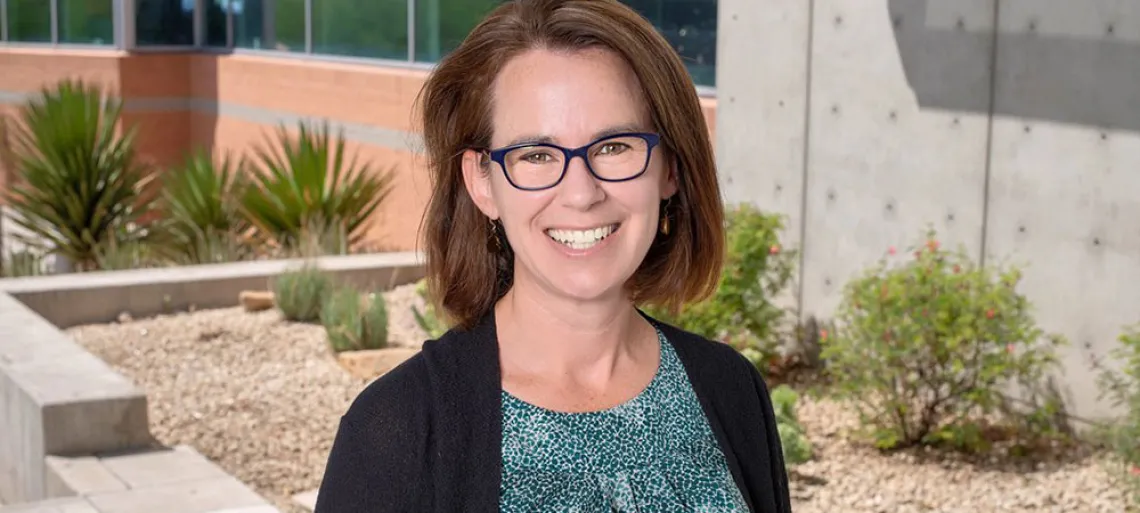Ashley Langer, Assistant Professor of Economics
Six Questions with Ashley Langer

"It is unusual for a university’s economics department to be located in a business school, so being a part of Eller has been a new experience for me. One really nice advantage is the ability to interact even more closely than usual with peers in finance, accounting, MIS, marketing, and management."
What brought you to the Eller College in 2012?
The economics department at Eller was a great fit for both my husband, Asaf Plan, and me. Eller is one of the few places that is strong in my fields of energy economics and industrial organization as well as my husband’s field of behavioral game theory. These strengths meant that both of us would have a great group of colleagues and PhD students to collaborate with, which we really value. Plus Tucson is a great place to live, and the weather is a lot better than in Ann Arbor, Michigan, where we came from!
What is your current research, and what most excites you about that area of focus?
My research focuses on energy and environmental economics with the goal of developing better policies to protect the environment. Right now, I’m working on two main projects with my economics department colleagues: one with Derek Lemoine on how we should think about designing subsidies for new technologies like solar panels, and a second with Gautam Gowrisankaran and our former PhD student Wesley Blundell on evaluating the Environmental Protection Agency’s approach to enforcing the Clean Air Act. Both of these projects use economic theory and data analysis to try to improve environmental policy, both in terms of improving environmental outcomes and decreasing the costs of regulations to firms and individuals. I think that this type of research is critical in a political era where environmental impacts of economic activities are huge but environmental policies are very contentious.
What are you currently teaching, and what do you most enjoy about teaching?
I currently teach environmental economics for undergraduates and empirical environmental and energy economics for PhD students. For my undergraduate class in particular, I really enjoy introducing students to the different types of issues that arise when we consider environmental impacts in economic decision making. For some students who were not particularly interested in environmental policy before taking the course, this just means that they will be more informed voters and citizens when they graduate. However, there are other students who realize that there are substantial business opportunities related to environmental economics including emerging renewable energy technologies and improving quality of life in the developing world. Having students recognize that there are paths to professional success that involve improving our relationship with the environment is really exciting to me.
How do you bring your research into your teaching?
One of the great things about working on issues that are critical to current policy decisions is that they very naturally enter into classroom discussions of environmental policy. For example, in my environmental economics class we talk about how to deal with pollution from driving. I have recent work that explicitly tries to understand whether a gasoline tax, like we currently have, or a tax on the miles vehicles drive, as has been proposed, would be more effective at improving overall welfare. This requires thinking not only about the local pollution generated by driving, but also about how driving affects congestion, accident risk, carbon emissions, and a host of other potential externalities. I ask students to think through these issues both intuitively and mathematically in order to understand the tradeoffs that policymakers face every day. Then we can turn to the most recent economic report of the President, which grapples with just these issues, and see how top economists in the White House have thought about these problems in very similar ways. Not only does this expose students to cutting-edge research, but it also shows that the tools they are learning in undergraduate economics classes are being used at the highest levels of government, which may encourage some students to pursue policymaking as a career after leaving Eller.
Beyond research and teaching, what are your passions?
Getting outdoors is critical for me mentally and physically. These days, with a one-year-old and three-year-old, that generally means running with a stroller, but I hope to get back to hiking and trail running as the kids get bigger. I find that physical exercise combined with being in nature is great for both creative thinking and coming back to work feeling refreshed. That’s part of what makes living in Tucson so amazing: magnificent trail heads are 20 minutes from campus!
What does the Eller Experience mean to you?
It is unusual for a university’s economics department to be located in a business school (rather than a liberal arts school), so being a part of Eller has been a new experience for me. One really nice advantage of being in Eller is the ability to interact even more closely than usual with peers in finance, accounting, MIS, marketing, and management. I think that this close exchange also shows in the undergraduate business economics major, where students have much more exposure to applied business insights than an economics major would anywhere else I’ve been.

